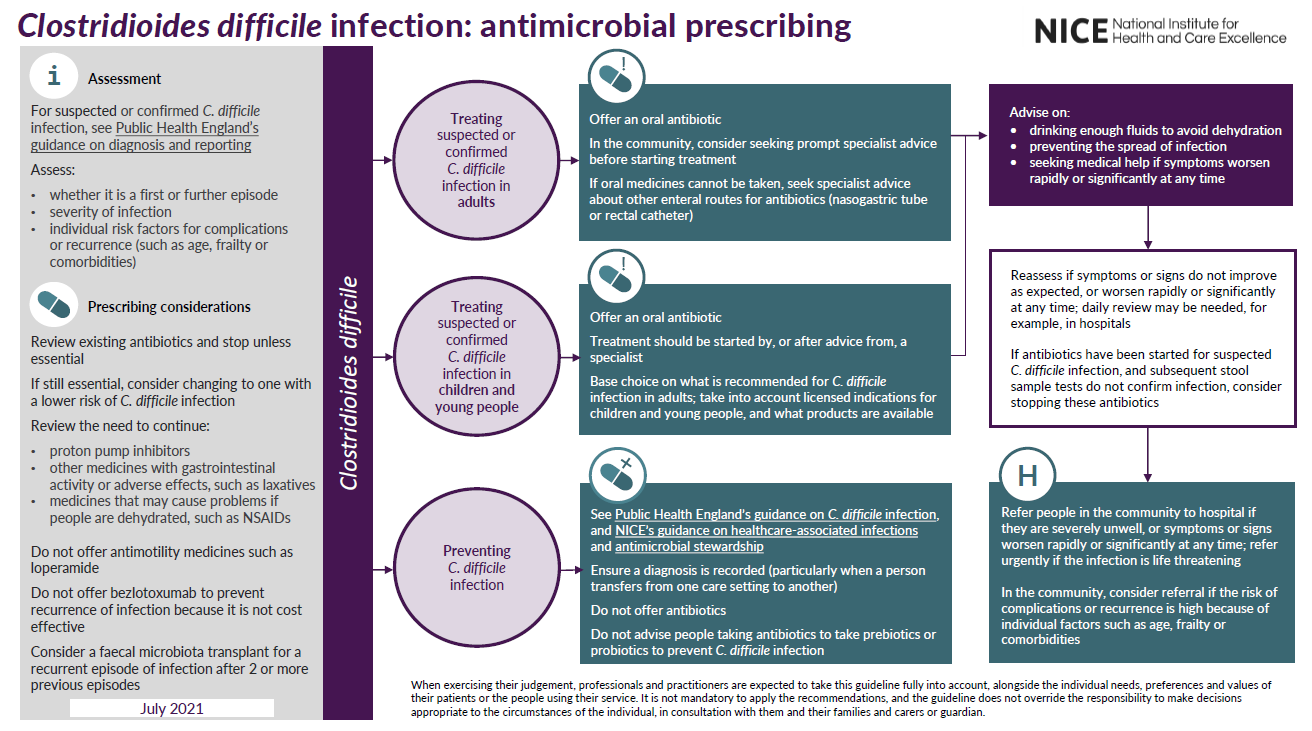Overview
This guideline sets out an antimicrobial prescribing strategy for managing Clostridioides difficile infection in adults, young people and children aged 72 hours and over in community and hospital settings. It aims to optimise antibiotic use and reduce antibiotic resistance. The recommendations do not cover diagnosis.
NICE has also produced guidance on antimicrobial stewardship and healthcare-associated infections.
Last reviewed: 11 July 2024
We reviewed this guideline and plan to update it. See the surveillance decision for further details.
How we prioritise updating our guidance
Decisions about updating our guidance are made by NICE’s prioritisation board. For more information on the principles and process, see NICE-wide topic prioritisation: the manual.
For information about individual topics, including any decisions affecting this guideline, see the summary table of prioritisation board decisions.
This guideline partially updates interventional procedures guidance 485 (March 2014), and also updates and replaces technology appraisal guidance 601 (September 2019), medtech innovation briefing 247 (February 2021) and evidence summaries: ES13 (June 2013) and ESNM1 (July 2012).
Recommendations
The guideline contains recommendations on:
- assessment
- treating suspected or confirmed C. difficile infection
- advice
- reassessment
- referral
- choice of antibiotic
- preventing C. difficile infection
See the 2-page visual summary of the recommendations, including a table to support prescribing decisions.
Who is it for?
- Healthcare professionals
- People with C. difficile infection, their families and carers
Guideline development process
How we develop NICE guidelines
NICE worked with Public Health England to develop this guidance.
Your responsibility
The recommendations in this guideline represent the view of NICE, arrived at after careful consideration of the evidence available. When exercising their judgement, professionals and practitioners are expected to take this guideline fully into account, alongside the individual needs, preferences and values of their patients or the people using their service. It is not mandatory to apply the recommendations, and the guideline does not override the responsibility to make decisions appropriate to the circumstances of the individual, in consultation with them and their families and carers or guardian.
All problems (adverse events) related to a medicine or medical device used for treatment or in a procedure should be reported to the Medicines and Healthcare products Regulatory Agency using the Yellow Card Scheme.
Local commissioners and providers of healthcare have a responsibility to enable the guideline to be applied when individual professionals and people using services wish to use it. They should do so in the context of local and national priorities for funding and developing services, and in light of their duties to have due regard to the need to eliminate unlawful discrimination, to advance equality of opportunity and to reduce health inequalities. Nothing in this guideline should be interpreted in a way that would be inconsistent with complying with those duties.
Commissioners and providers have a responsibility to promote an environmentally sustainable health and care system and should assess and reduce the environmental impact of implementing NICE recommendations wherever possible.
